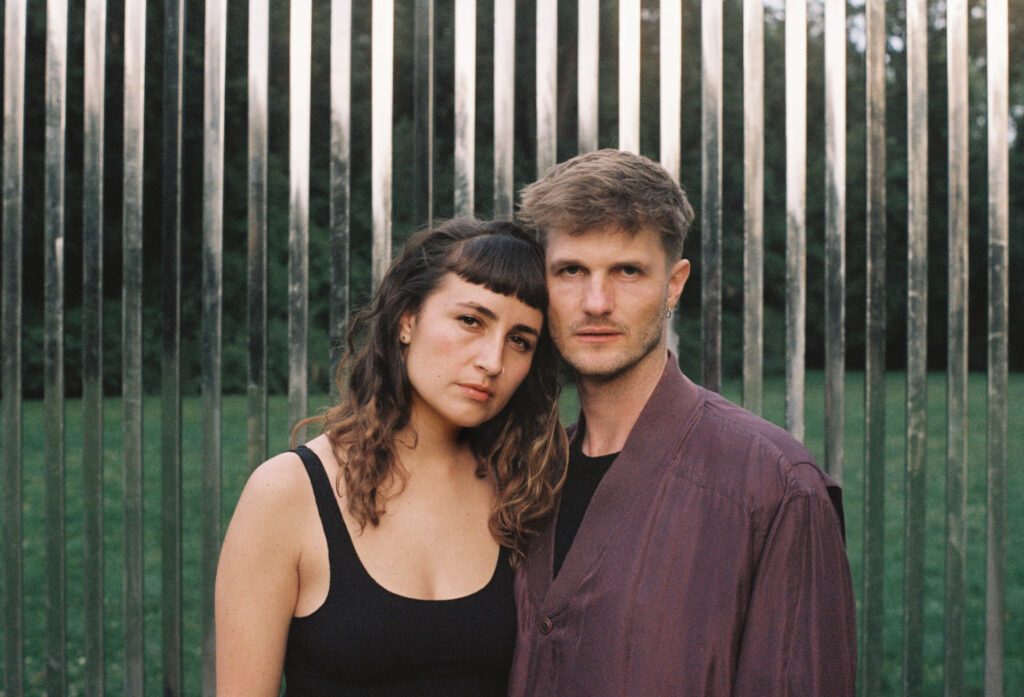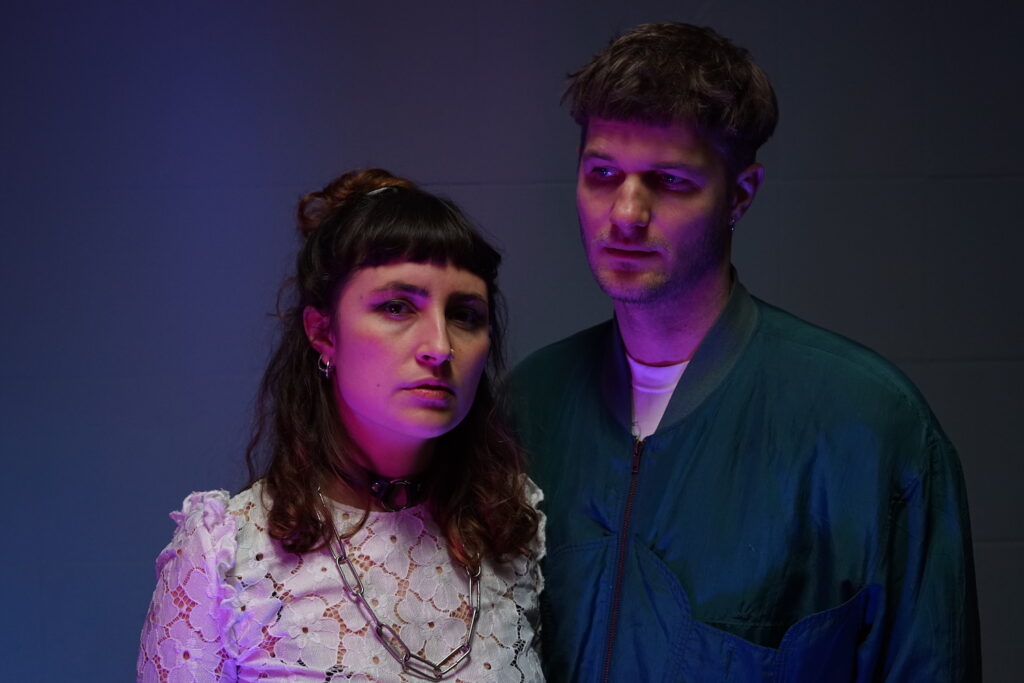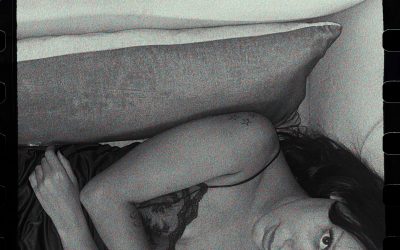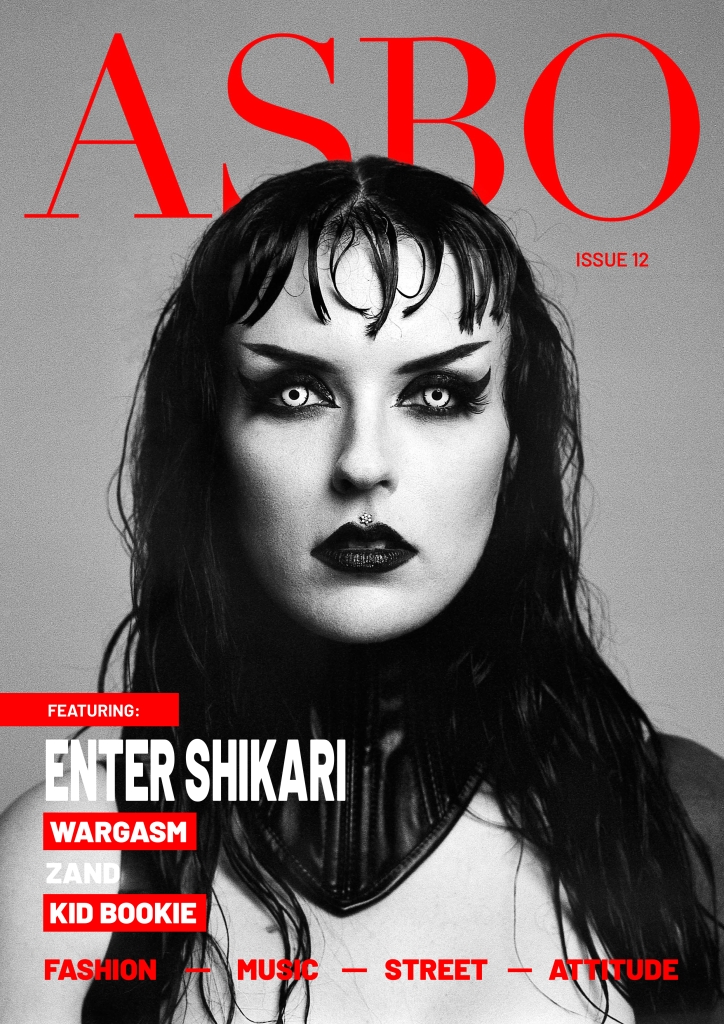
When Ameli and Paul’s paths crossed in 2016, they immediately felt the urge to fuse their approaches of making music – the succinct and intricate productions of Paul, with Ameli’s sentimental voice and inherent songlike musicality. Constantly honing and evolving their live performance and studio output ever since, the duo now stands for a stirring electronic sound that ranges from abstract cinematic excursions all the way through to more pop-leaning song structures.
Following the critically acclaimed release of their stunning three-part Beyond Reason EP on MEIOSIS back in February, the Berlin-based electronica duo now looks to end 2021 in emphatic fashion, pulling out all the stops with their remarkable new Mycelia EP.
How did you each get into music?
Ameli: As my parents and my siblings are all musicians, music was omnipresent in my home. Though I was taking lessons in drums, piano, violin and opera singing, my favourite place to be was always at the piano singing my own songs. At the age of 16 I finally had my first band. We were rehearsing and jamming in a little room in the basement, playing concerts and from then on, I couldn’t imagine doing something else.
Paul: As a small kid we had some percussion elements in the living room and I would add other boxes to create my own drum set. Eventually I sang in my own language until I wrote my first lyrics in German at the age of 9. In my youth it was all about HipHop, and my cousin and I were heavily involved in producing beats and rapping while also going to music school and learning to play the classical guitar.
How did you both meet and what inspired you to work together and become a duo?
Paul: It was at a small festival where Ameli played with her band and I played my solo live set. We instantly loved the musical energy of each other and we arranged to meet in the studio. That session was magical for both of us. We jammed for 4 hours and were amazed by the dynamic and creativity. Afterwards we knew that we had to start Ameli Paul.
In your Spotify bio, you say that when you met back in 2016, you immediately felt the urge to fuse your approaches to making music. So, how would you describe your individual creative approaches?
Paul: I would say our approaches are quite different but somehow harmonizing in a good way. Ameli is a tremendous live musician and an amazing composer. When on stage or sitting in front of a piano she would always come up with something original and new. She loves improvising and putting all her emotions in the very moment. For me, the magic moments happen when experimenting with sounds in front of my laptop, exploring my field recordings in order to find interesting rhythms and playing around with synth and bass lines. Very often coincidence plays a major role. In some funny way we both are constantly exploring further and are never satisfied with repeating ourselves. Maybe that’s why our tracks always sound very different and people have a hard time putting us in a drawer.
How would you describe your merged sound for people who have never heard you before?
It’s electronic music ranging from 80 to 130bpm. We use synthesizers as well as organic field recordings or traditional instruments like guitar or piano. Of course, Ameli’s voice is a connecting element that sometimes appears as the main motive as in pop songs (e.g., Beyond Reason, Open Fire, Dolphins) but also sometimes as an atmospheric element going through a lot of analogue delays, reverb and other alienating effects (like in Voce, Dry Cough, That’s the problem).
Why did you decide to use your real first names as the official name of the duo?
Actually, it’s our second names and both of us always liked them but they kind of waited for their moment to shine. Now, people have actually started calling us Ameli or Paul.
What does a day in the studio with Ameli Paul look like?
We really don’t have a routine as we have no studio at the moment, and have moved a lot in the last year. It also depends on the things that are due. Sometimes we would just set up all our gear, start playing around with synths and beats and press the record button until we have like one hour of material and see what we can use. That’s how Beyond Reason was created. But sometimes we have listened to an instrumental Paul was creating at home, and go into mixing details or arrangement together. For us, beginning a track feels easy and creative. Coming to the end and finishing a piece is painful, but at the end a big relief to let go of our baby.

What are your main themes of inspiration when it comes to making your music?
Paul: For me it’s personal moods, things that I experience in life and coincidence. I like to play around without any goal in mind and see what comes around. I never have the intention to create a certain sound or style. I like foggy weather, autumn and winter are my favourite seasons to create. But I also get inspired by going out, long nights of dancing and taking that feeling of freedom and detachment to the studio.
Ameli: It can be the loud and busy street outside my door, the behaviour of people around me, snippets of conversations or the tasty lemon ice-cream. By playing my own music I am able to feel my deep emotions. So, when I am sad or happy about something, I feel the urge to go to the studio and write a new song. And then I think all sources of inspiration come together in an intuitive way.
I’d say the Mycelia EP you’ve released this year sounds pretty dark and ambiguous. What was the creative process of this piece of work and what did you aim to transmit through this project?
That’s true and we feel like it (sadly) pretty much fits into the current time of social division and pandemic shut downs. It’s probably the most edgy and experimental Ameli Paul release to date and can be understood as counterpart to releases like Dolphins. In our heart we are rather melancholic people but there are also emotions like anger, wish for escape and experimentation that (probably) unconsciously finds its way into our music. Mycelia is a trip through different states of consciousness.
If you could put your music as part of the soundtrack in a movie, which movie would it be and why?
As the music video for Voce shows we are huge fans of David Lynch. His films have a strong imagery that allows music to be strange, psychedelic and emotional. Composing for film is something that really intrigues us. Ameli for example, is writing and performing the score for a theatre play in Basel next year.
You’ve released two EP’s this year, which is amazing. It shows that you guys must be very dedicated when making music. Have you ever gone through a phase of uncertainty or self-doubt when it comes to making your music?
I guess self-doubts and uncertainty are one of the main drives for our creative work. Vulnerability allows your emotions to transmit into art or music whatever you want to call it. Nevertheless, making music also calls for courage and confidence which is important to not hold back and make bold decisions in writing, recording and editing.
Both of us rather write lyrics and music about ‘bad’ emotions triggered by sadness, disappointment and doubts, rather than happy, light moments of joy and happiness. For us it’s a form of transformation and coping.
The worst thing that could happen is to start comparing yourself to others. It brings you away from your very own language and individual path. Still, we all do it too many times and then feel like we are not good enough. It comes in waves and for us live concerts are an essential part as it fills us up with good emotions in conjunction with our music and shows us what it does with people. When someone from the audience approaches us after a show, and tells us that they were moved to tears, we know that our work somehow has a reason for being.
What do you hope for listeners to take from your music?
We really wish that our music has an effect on the listener. Be it a weird, emotional, melancholic or a happy one. Nothing is as bad as background elevator music that is purely functional. We receive messages where people describe how our music helped them go through difficult phases or accompanied them during an important time in their lives and that’s beautiful and motivates us to continue translating our experiences and emotions into music.
What’s one thing you would change about the world this second if you could?
Make people less greedy, more humble and more empathetic. The world is a gift but (we all) treat it like shit, and we wish that we all treated it more mindfully and with care.
What advice would you give people trying to make a career in music?
Don’t try to make a career 🙂 Do it if it feels like something that you have to do and do what feels right. Try to find out what it is that you are in for. Don’t force or push it. Also don’t give up too easily. But who are we to give you any advice? Maybe it’s all about staying curious and humble. Never grow up, never stop learning new things, but also from time to time, forget everything you know so you don’t get stuck in beaten paths.
Give us a sneak peek of what’s to come from Ameli Paul in 2022?
In January we are going to do the final mix of our Album with the help of Aaron Ahrends. The release date is not final yet, but it will come out in 2022. Later in January, we are going to Mexico for some shows and if Omicron is not destroying all our plans, we are looking forward to a beautiful support tour and the festival season.
Listen to Mycelia [EP] here
Ameli Paul: Instagram | Facebook | Soundcloud | Beatport | Spotify
Images: Press shots










